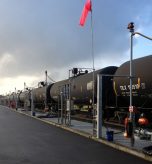Introduction
Amid increasing competitive pressures and complex distribution requirements, petroleum refineries must maintain exceptional logistics performance to ensure business continuity and customer satisfaction. A leading North American petroleum refiner struggled with transportation reliability issues threatening production schedules and customer relationships. With multiple refineries processing over 500,000 barrels per day and distributing finished products across 15 states, the company’s existing logistics infrastructure couldn’t adapt to changing demand patterns, resulting in delivery delays and increased costs. The refiner needed a solution to transform their transportation network while maintaining regulatory compliance and meeting strict delivery windows. Our consulting team’s advanced supply chain expertise offered a path forward that would revolutionize their logistics operations while delivering measurable ROI across their distribution network.
At A Glance
A major petroleum refining operation transformed its logistics capabilities through our firm’s specialized transportation management solution, resulting in a 23% reduction in freight costs and 97% on-time delivery performance within six months of implementation. The company overcame critical challenges in carrier capacity, seasonal demand fluctuations, and regulatory compliance by leveraging our expert’s deep understanding of petroleum transportation requirements and truck market dynamics.
Requirements:
- Implementation of real-time transportation visibility across a complex network of terminals and delivery points
- Integration with existing ERP systems and regulatory compliance tracking mechanisms
- Specialized carrier management program addressing the unique requirements of hazardous materials transportation and HOS regulations
The Challenge
The refiner operated in an increasingly competitive market environment where transportation reliability directly impacted customer satisfaction and market share. With over 200 daily shipments of refined products departing from multiple terminals, their logistics team struggled with several critical issues:
The volatile nature of petroleum markets created unpredictable demand patterns, making it difficult to secure reliable truck capacity during peak periods. This resulted in frequent service failures, and emergency expedites that increased transportation costs by an estimated 30% above industry benchmarks. The situation was particularly acute during seasonal demand spikes when competing with agricultural and other seasonal shippers for limited carrier capacity.
Additionally, the company faced complex regulatory compliance requirements for hazardous materials transportation. Each shipment required specialized equipment, driver certifications, and stringent documentation. Their manual carrier qualification and compliance verification processes couldn’t scale with business needs, creating compliance risks and operational bottlenecks.
Further complicating matters, their legacy TMS lacked visibility into real-time shipment status, making it impossible to address service disruptions proactively. Without advanced analytics capabilities, the company couldn’t identify optimization opportunities or effectively negotiate with carriers based on accurate performance data.
PraxiChain Solution
- Implemented a dedicated carrier management program leveraging our team’s extensive truck market knowledge to develop partnerships with specialized petroleum carriers, creating a core carrier program with guaranteed capacity commitments
- Utilized advanced load optimization algorithms to maximize equipment utilization and reduce empty miles, resulting in substantial cost savings and environmental benefits
- Established automated compliance documentation management, ensuring all shipments adhered to DOT, HAZMAT, and other regulatory requirements
- Integrated predictive analytics to forecast capacity needs based on historical patterns, market conditions, and seasonal variables
- Created customized performance dashboards providing executives with real-time visibility into key logistics metrics and cost drivers















